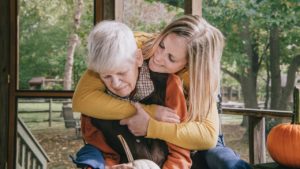There’s a common misconception that when somebody is diagnosed with dementia, they lose their independence and can no longer live alone. While down the road in the illness course of dementia, this may be true, there is A LOT that a person with dementia CAN DO to remain living independently and safely in their home.
This episode is a must listen if you or someone you know is newly diagnosed with dementia and looking for what to do next.
In today’s episode, I share
5 key strategies for helping adults living with dementia remain independent and living safely in their home for as long as possible
1. Simplify your daily tasks.
- Establish a routine: Even if we don’t have dementia, a daily routine helps our bodies and mind function optimally, and the same is true for folks with dementia. A routine helps the person with dementia to anticipate what is next in the day, even if they can’t remember.
- Create strategies for managing your money: Setting up automatic deposit and bill pay with your bank is an excellent strategy for making sure your money gets deposited on time and your bills are paid. Consider having a trusted family member or friend review your finances monthly or quarterly.
- Set up your medications so that they’re easy to remember to take. Mis-dosing and forgetting if you took a medication and then take more is a common and dangerous issue that can arise with dementia. Using a traditional pill box or a pill box with reminders can be helpful. Invite a trusted family member or a friend to help you with medication management.
- Adequate nutrition and meals. Having adequate nutrition and hydration is essential to staying living independently. It can help to plan your meals. If you’re maintaining a routine, as previously mentioned, this will be easier to do. Meal delivery programs may be an option if it’s hard to get to the store, like Meals on Wheels America (1-888-998-6325)
- Prepare for how to get around independently after you stop driving. At the beginning of a dementia diagnosis, you may be able to remain driving safely, but chances are, you will need to stop driving at some point and the sooner you prepare for remaining independent after you stop driving, the better. To learn about the transportation options near you, contact your local Area Agency on Aging and ask to speak with a “mobility counselor”. Find your Area Agency on Aging by using the Eldercare Locator (1-800-677-1116).
2. Create Safety in Your Home
- Declutter your house and get rid of things that you no longer need or use like extra furniture or extra clothes. Remove objects on the floor like heavy rugs or electrical cords. These items increase your risk of falls. Consider installing handrails. If you’re noticing that you’re becoming more and more forgetful, use resources to shut off your stove automatically. Make sure that your smoke and carbon monoxide detectors are working properly.
- Enroll in the MedicAlert + Alzheimer’s Association Safe Return program (1-800-432-5378). Six out of 10 people with dementia will become confused when away from their home. This program gives you a response plan if this happens.
3. Plan for your future.
- Prepare all of your legal and financial matters as soon as possibleOne of the most important things that you can do when you’re newly diagnosed with dementia, especially when you’re in the early stages and still have capacity to make all of your decisions and express your wishes clearly is to prepare all of your legal and financial matters as soon as possible. For example: Durable Power of Attorney, Durable Power of Health Attorney, Last Will & Testament.
- Your care needs will change over time; it will help to plan for care options and how you will pay for your care. For example: Early on a home health aide may assist you in your home and further down the road, you may need assisted living. Taking the time to understand Medicare, Medicaid, and if you’re a Veteran, Veterans Health Administration resources, will set you and your family up for smoother transitions. Many Area Agencies on Aging have medicare/medicaid counselors to help you think through this: Eldercare Locator (1-800-677-1116)
4. Gather Your Support System Around You
One of the best ways to stay living independently for as long as possible, is to be sure that you do have a community around you so that you don’t become isolated or withdrawn.
- Identify the people that you trust and write down their names and phone numbers and where they live.
- Keep a copy of this list in important places like on your refrigerator, in your car, and share it with friends and family.
- Consider sharing this list of contacts and your diagnosis with neighbors who you trust. Neighbors are often the first people to notice if you are not yourself or look disoriented.
5. Maintain Your Medical and Mental Health
- Even if you do have dementia there are many strategies to help slow down the progress of dementia including: exercise, maintain a healthy diet and healthy sleep habits, stay socially connected, and managing your stress.
- It’s also important to follow medical advice for other medical problems. Having optimal physical health will help your brain function optimally. In the same regard, if you’re experiencing mental health concerns like insomnia, depression, anxiety, suicidal thoughts, it’s important to connect with mental health providers.
- With a new diagnosis of dementia, there is evidence to show that there is an increase of depression symptoms and suicidal thoughts. There is help and hope- you don’t have to live with this level of suffering alone. If you’re having suicidal thoughts or in crisis, please call the National Suicide Prevention Lifeline at 1-800-273-8255.
It’s a tough road in the beginning of living with dementia and adjusting to this new diagnosis. The recommendations in this article will help you to live well in your home for as long as possible.
Links mentioned in this episode:
- Meals on Wheels America (1-888-998-6325)
- Find your Area Agency on Aging by using the Eldercare Locator (1-800-677-1116)
- MedicAlert + Alzheimer’s Association Safe Return program (1-800-432-5378)
- Alzheimer’s Association (1-800-272-3900)
- National Suicide Prevention Lifeline (1-800-273-8255)
- Download the free Roadmap to Stopping Driving
- Download the free Essential Documents Checklist
- Download the free Memory Loss Guide
Reference:





